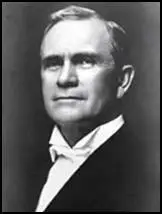Braxton Comer

Braxton Comer was born in Spring Hill, Barbour, on 7th November, 1848. After graduating from the University of Alabama and the University of Georgia, Comer became a banker.
Comer invested in several different businesses including a cotton plantation and a textile factory. In 1890 he moved to Birmingham, Alabama and served as president of the Railroad Commission of Alabama (1905-06).
Comer, a member of the Democratic Party, was elected as governor of Alabama in 1907. The following year, the trade union leader, Mary Mother Jones, wrote an article in the socialist journal, Appeal to Reason, that revealed that Comer was illegally employing young children in his textile factories.
After retiring as governor in 1911, Comer concentrated on his business interests. However, he did serve for a short time in the United States Senate (March, 1920 to November, 1920). Braxton Comer died in Birmingham on 15th August, 1927.
Primary Sources
(1) In October, 1908, Mary Mother Jones wrote about child labour in the socialist journal, Appeal to Reason . The article dealt with the factory owner, Braxton Comer, the Governor of Alabama who owned a large textile mill near Birmingham.
It had been thirteen years since I bid farewell to the workers in Alabama, and went forth to other fields to fight their battles. I returned in 1908 to see what they were doing for the welfare of their children. Governor Cromer, being the chief star of the state, I went to Abdale, on the outskirts of Birmingham, to take a glance at his slave pen. I found there somewhere between five and six hundred slaves. The governor, who in his generous nature could provide money for Jesus, reduced the wages of his slaves first 10 per cent and then 16.
As the wretches were already up against starvation, a few of them struck, and I went with an organizer and the editor of the editor of the Labor Advocate to help organize the slaves into a union of their craft. I addressed the body, and after I got through quite a large number became members of the Textile Workers Union.
When I was in Alabama thirteen years ago, they had no child labor law. Since then they passed a very lame one. They evade the law in this way: a child who has passed his or her twelfth year can take in his younger brothers or sisters from six years on, and got them to work with him. They are not on the pay roll, but the pay for these little ones goes into the elder one's pay. So that when you look at the pay roll you think this one child makes quite a good bit when perhaps there are two or three younger than he under the lash.
One woman told me that her mother had gone into that mill and worked, and took four children with her. She says, "I have been in the mill since I was four years old. I am now thirty-four." She looked to me as if she was sixty. She had a kindly nature if treated right, but her whole life and spirit was crushed out beneath the iron wheels of Comer's greed. When you think of the little ones that his mother brings forth you can see how society is cursed with an abnormal human being. She knew nothing but the whiz of a machinery in the factory.
The wives, mothers and the children all go in to produce dividends, profit, profit, profit. The brutal governor is a pillar of the First Methodist church in Birmingham. On Sunday he gets up and sings, "O Lord will you have another star for my crown when I get there?"
I saw the little ones lying on the bed shaking with chills and I could hear them ask parent and masters, what they were here for; what crime they had committed that they were brought here and sold to the dividend auctioneer.
The high temperature of the mills combined with an abnormal humidity of the air produced by steaming as done by manufacturers makes bad material weave easier and tends to diminish the workers' power of resisting disease. The humid atmosphere promotes perspiration, but makes evaporation from the skin more difficult; and in this condition the operator, when he leaves the mill, has to face a much reduced temperature which produces serious chest infections. They are all narrow-chested, thin, disheartened looking.
